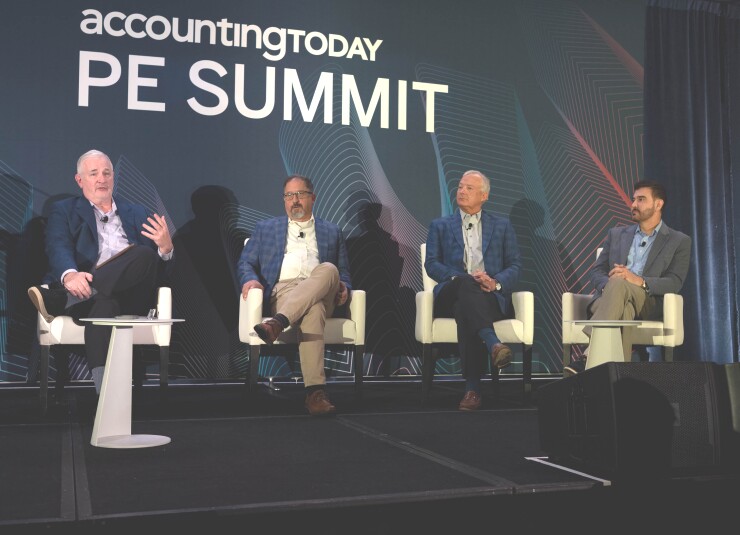
With every day seemingly bringing word of a new private equity investment in the accounting profession, many accountants are declaring their determination to remain independent — but that's not as simple as not signing a deal.
"There's plenty of room for staying independent, but accounting firms that want to stay independent have to change how they play the game — and we're not seeing firms have the discipline to do that," said Bob Lewis, the president of The Visionary Group, during a panel on the subject at Accounting Today's PE Summit, held this week in Chicago.
"If we're going to be independent, then we're going to have to be more intentional about how we grow, and how we hold ourselves accountable," agreed Jeff Barbacci, the managing shareholder of Thomas Howell Ferguson.
With PE-backed accounting firms flush with cash and supported by extra resources and guidance in technology, recruiting, M&A and more, firms that want to remain independent must have strategies in place to be able to compete. Among other things, that will likely mean greater accountability for partners and firm leaders; more thoughtful, data-driven growth strategies; a stronger push into more-profitable advisory services; stricter adherence to goals of all kinds; and more intentionality in every aspect of firm performance.
"PE has raised the bar for all of us, and that's a very good thing," Jim Meade, CEO and managing shareholder of Top 100 Firm LBMC, told attendees. "Professional services businesses had been largely unchanged until the arrival of PE. They're professional investors, and they've raised the bar. It has changed our strategy in everything we do."
"We're having more direct conversation with our group about enterprise value and how you create it," added Barbacci. "That's a difficult conversation with our shareholders — what drives value and how you create it, and what we're buying from them when they retire."
Staying independent may also mean finding other sources of capital, whether it's lines of credit from a bank, another form outside investment — or the partners' pockets.
"One of the challenges is getting shareholders to understand that if we're going to invest, that means you're going to take less home in your draw," Barbacci explained. "Shareholders need to want to invest and to have a commitment to the long-term sustainability of the firm."
Meade, however, was not entirely convinced that firms need to access so much capital that they need to go to PE for it.
"We have access to significant credit lines," he said. "We're accountants; we don't like to borrow money. The cheapest capital is your own. We put a third to our bottom line; the money's there, it's just a question of if you're willing to use it. And banks are happy to lend money to accounting firms."
In particular, he questioned whether firms need to invest as much money in technology as some, including many of the PE firms that LBMC has met with, seem to think.
"I can't come up with a use case where we need a significant amount of capital where we don't have it internally or can't borrow it from a bank," he said.
Why stay independent?
Simply not needing outside capital, however, does not explain the seriousness with which all three of the firm leaders on the panel are maintaining their independence.
"We don't use the word 'independent' internally; we say control," explained David Bundy, the president and CEO of Top 100 Firm Dean Dorton. "We're a second-generation firm, we've been successful, and we want to maintain that control. We want to make the decisions we want to make, we want to make the investments we want to make. So it's control for us."
Controlling their own destinies is important for all three firms – and not just for the current generation of leaders.
"We're a third-generation firm," said LBMC's Meade. "As we talk with our young owners, they passionately want to remain independent, so it's important for us to do that — as long as we see a sustainable path forward, we're going to do that."
Finally, all the panelists agreed that — with the facts within their firms and in the broader landscape changing so frequently — the decision to remain independent is one they need to revisit on a regular basis.
"It's a constant for us," Bundy said. "When PE first came, we decided it wasn't for us, and we just parked it, but two years ago we realized we couldn't just leave it. We have conversations regularly – and we know that when the time comes that we need capital, we know where to find it."
"I think about it daily. As a group we talk about it at least annually and make sure we are making the decisions for the right reasons," said Barbacci, adding, "If the shareholder group can't sustain itself and drive the growth we need … and if we're not moving the needle, I'd consider a change, but I still think, for us, it's going to come down to the ability to grow – if we can't do that, we'll end up having to merge, but even there I think we'd prefer an upward merger with a firm that feels the same way."
Added Meade, "We probably don't revisit it frequently enough. It's about making sure that you have the right strategy and the right resources to be successful."





